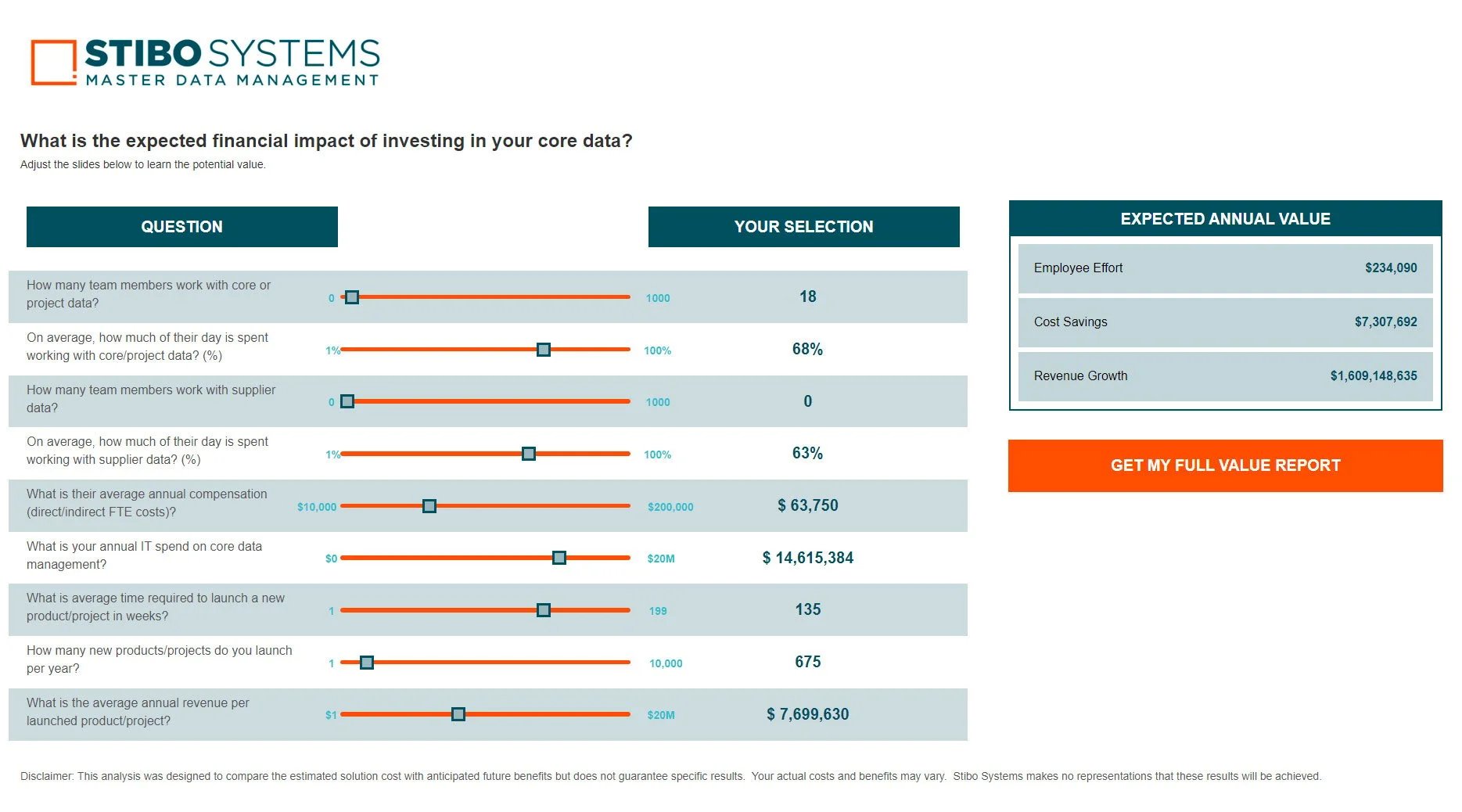Product Information Management
Understand our trusted product information management system that can help you accurately collect, organize, and share key product information throughout your entire enterprise.The latest SPARK Matrix™ research report provides a comprehensive analysis to help you stay ahead. Inside, you’ll find how Stibo Systems leads the Product Information Management market for customer impact and technology excellence and more.
Access the Full Report
Product data can lose more than 15% of its accuracy, quality, and value as it is shared and updated. This leads to questionable data and business decisions.
Discover how Product MDM solves these challenges with fair and accurate product data management solutions.
Watch the videoGo beyond PIM to accelerate digital transformation and growth
Data sourcing
Product master data management enables you to efficiently collect, collate and onboard accurate, up-to-date information from a wide range of internal and external sources, including manufacturers, brand owners and content service providers.
Options include an integrated import manager that enables enhanced onboarding through Smartsheets, supplier item Web UI and GDSN subscriptions. These tools make it easier to ingest data, ensuring it’s available for effective use within business processes.

Data integration
A rigid product master data policy demands that all data touchpoints be synchronized with the system of record. Product MDM can serve as the central repository for this data and the source of information and content to be sent to downstream systems and applications. Stibo Systems’ open platform supports a growing list of inbound and outbound integrations, including tools to assign and manage unique global identifiers to attributes across the enterprise.
Integrations include MongoDB, Amazon SQS, SAP Material Master Connector, Hybris, and Ariba CIF/cXML, as well as outbound data integration using traditional ETL techniques.
Organizations implementing Product MDM with other apps will find this combination, along with our existing integration suite (Oracle AQ/JMS/IBM Websphere/REST/JSON), offers a wide variety of options to quickly realize business objectives.

The solution also includes seamless integrations with leading translation services and a print publishing solution.
Data modeling & data governance
Product MDM leverages data modeling, roles, workflows, business rules and controls to efficiently guide and govern how data is used, managed and shared across the business ecosystem.
The solution features machine learning-based auto-classification and powerful mapping tools to associate products with multiple classification structures, domains, entities, and assets. These provide univocal terms of reference to support superior decision-making and business results.
With Product MDM, users can implement and enforce policies from the start, unlike many traditional PIM solutions, which often lack the ability to create golden records or match and link products. This ability ensures stability and consistency across all touchpoints.
In addition to standard attributes, classifications, and references, Product MDM offers additional modeling and governance features to deliver trusted data to meet specific industry needs. These include rule-based product classification, supply chain packaging, and hierarchy management, a data catalog connector, and fast-start prescriptive support for vertical markets.
Content quality & Digital asset management (DAM)
The solution ensures data is accurate and fit for purpose by leveraging a range of tools for maintaining and enriching content, including data cleansing and. enhanced error handling/data validation features, which flag errors between sessions, accuracy, completeness and sufficiency metrics, and configurable faceted search.
Product MDM also includes integrated DAM, enabling the organization, storage and retrieval of constantly growing volumes and varieties of unstructured content, including images, audio, video, animations and other digital assets.
With the solution, you can protect asset ownership, integrity and copyrights by previewing watermarks before applying them to content. It also includes features to simplify image/content management, including an Adobe Experience Manager (AEM) adapter.
Product MDM provides:
- Image meta-tagging – AI/machine learning automatically classifies and enriches assets with metadata via the Google Cloud Vision API. This saves time manually tagging images to enable search, matching and linking.
- Image deduplication – AI/machine learning identifies and removes duplicate images to maintain library efficiency, speed image selection and performance, and reduce storage requirements.
Data sharing & syndication
The solution’s proven importing and exporting approach conforms to leading industry standards, ensuring trading partners adhere to the same guidelines. This includes performance optimization for GDSN, for onboarding and publishing GS1 formatted data, enhanced support for the AutoCare and TecDoc automotive standards, and continuous updates to the BMEcat, ECLASS, ETIM and UNSPSC classification systems.
Additionally, Stibo Systems PDX Syndication interoperates seamlessly with Stibo Systems Product MDM system, enabling manufacturers to deliver consistent, high-quality product lifecycle information and content formatted to meet retailers’ unique data standards or channel requirements.
PDX Syndication’s seamless integrations and optimized workflows allow data standards and requirements to be automatically managed and updated, making it easy to meet evolving data requirements.
McDonald's started its MDM journey by managing the supplier master data domain and is now working on implementing a PIM solution. Watch the full video with Alex Bähr, Director of Supply Chain Products, to hear more about their business objectives and how their KPI has improved over time.
Watch the VideoCustomer references you can trust
Unlock the power of your product information through better data management. Marks & Spencer, the British international multichannel retailer, used Product MDM to automate data entry and reduce errors, and can now manage detailed content for multiple websites.
Marks & Spencer, the British international multichannel retailer, used Product MDM to automate data entry and reduce errors, and can now manage detailed content for multiple websites.
 SBT emerged from several different acquisitions, resulting in siloed data management. With Product MDM, they gained a single source of truth and were able to consolidate and remove 98 % of data errors.
SBT emerged from several different acquisitions, resulting in siloed data management. With Product MDM, they gained a single source of truth and were able to consolidate and remove 98 % of data errors.
 The Kellogg Company, a food and beverage manufacturer, used Product MDM to create a single version of the truth for all products globally, improve the accuracy and validation of product and nutrition information, and launch products faster.
The Kellogg Company, a food and beverage manufacturer, used Product MDM to create a single version of the truth for all products globally, improve the accuracy and validation of product and nutrition information, and launch products faster.
Why Stibo Systems Product Information Management
Trusted product data
Faster time to market
Engaging experiences
Data management projects are hard to quantify. There is great financial value to be gained from improving reference data quality and automating real-time data processes. But how do you estimate it? The ROI Calculator can help you build your business case for master data management.
Get your customized ROI report
READY TO SEE MORE?
.png?width=540&height=320&name=MicrosoftTeams-image%20(20).png)




